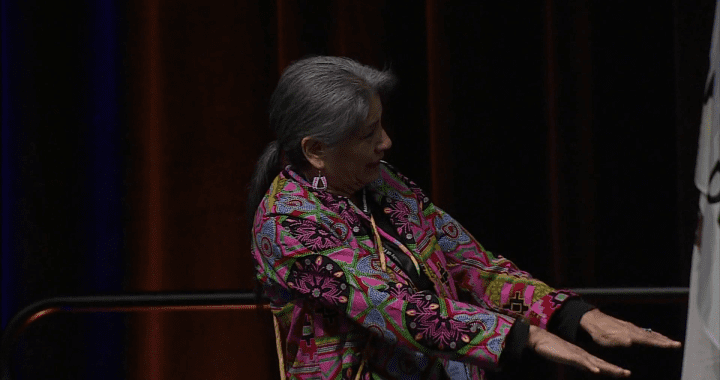Seven years ago, Melanie Mark was celebrating her victory in the provincial election – and for becoming the first First Nations woman to be sworn into the legislature in British Columbia.
Fast forward to 2023, and that goodwill is gone.
“When I described it as a torture chamber, it is because of the things that I had to endure from the official opposition,” she said. “I’ve made it quite clear on the record that it’s mostly white men that have been particularly vile and rude.
“And quite honestly I just never imagined that that’s what it would be like for an elected official.”
There’s a long list of Indigenous women who have been forced from politics.
Jody Wilson-Raybould, once a star candidate for the federal Liberals, believes she was ousted from the party as punishment for refusing to intervene to stop the criminal prosecution of SNC-Lavalin on bribery charges related to contracts in Libya.
She told a Parliamentary committee that she faced relentless pressure from Prime Minister Justin Trudeau, his office, the top public servant, and others to do so.
She was eventually fired and sat as an Independent until the next federal election when she stepped down.
Mumilaaq Qaqqaq, the former NDP MP for Nunavut, didn’t hold back when she made her farewell speech to the House of Commons on June 15, 2021.
“Every time I walk onto the House of Commons grounds and speak in these chambers, I am reminded every step of the way I do not belong here,” she told her colleagues. “The federal institution needs to change its own policies and procedures to reflect reality instead of creating barriers for people like me. I should not be afraid of going into work.”
The rude awakening that Mark received comes as no surprise to Jessica McCallum. In 2018, she was the first First Nations woman to be elected to serve on the town council of Terrace, B.C. She resigned three years later.
“I think, in representing demographics that had never been represented prior in those levels of government, it’s quite difficult and you do experience the character assassination,” she told APTN News. “You do experience a lot of the bullying that she talked about in her resignation speech.”
McCallum said it was tough to hear about Mark’s treatment.
“I was extremely upset,” she said. “I cried when I first heard. She’s a great leader, she always has been in my opinion. I think they were tears of frustration mainly.”
Read More:
InFocus looks at the rise of Indigenous females and the issues they face
Nahanni Fontaine was elected as an MLA in the Manitoba legislature the same year Mark was elected. She still holds her seat.
“Yet again one of, you know, Canadian legislatures or Parliament have managed to be a place of such toxicity that it has pushed out another Indigenous woman MLA,” said Fontaine. “Another Indigenous woman politician when there are so few of us across the country.”
Fontaine said she has her own challenges in the Manitoba legislature. She said it’s a tough, toxic work environment that is predominately male and that she’s developed a strategy to deal with them.
“One of the coping skills that I use so that I am somewhat not a part of what is going on is that I only focus on the speaker of the House and so my focus is solely on the speaker so that I don’t get drawn so that my spirit doesn’t get drawn into that toxicity.”
Mark says she feels at peace now.
“I’ve received so much love from women and men and people across this province,” she said. “I cant walk down the streets right now without being stopped or chased, I have people chasing me, ‘Melanie I want to say something to you, thank you thank you thank you.’”










